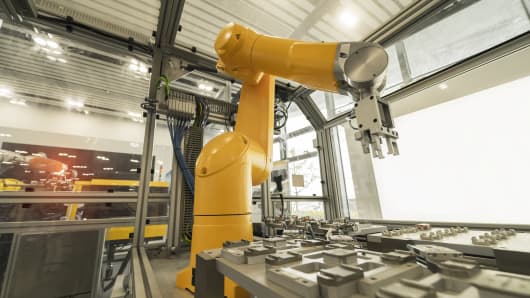
kynny | iStock | Getty Images
A robotic arm at an industrial manufacturing factory.
Robots took on a record number of jobs in North American firms last year, the Robotic Industries Association (RIA) said Thursday.
According to the RIA's data, 35,880 robots were shipped in 2018 to the U.S., Canada and Mexico, up 7 percent from the previous year. Of those shipments, 16,702 were to non-automotive companies — a year-on-year increase of 41 percent.
The consumer goods sector purchased almost 50 percent more robots in 2018 than in 2017, while life sciences saw an increase of a third.
However, shipments to the automotive industry slowed by 12 percent. The industry accounted for 53 percent of total robot shipments to North American companies — its lowest share since 2010.
"These sales and shipments aren't just to large, multinational companies anymore. Small and medium-sized companies are using robots to solve real-world challenges, which is helping them be more competitive on a global scale," said Jeff Burnstein, president of the Association for Advancing Automation — the RIA's parent company.
U.S. record
In the U.S. alone, robot shipments across all sectors increased by more than 15 percent, marking a record number of shipments to American companies.
Every sector included in the RIA's analysis saw an increase, with the exception of the automotive industry, where robot shipments to American vehicle makers fell by 30 percent.
Despite an increasing uptake of automation in the workplace, some have argued that companies should be doing more to preserve human jobs.
Last month, South African President Cyril Ramaphosa told a press conference that policymakers needed to "deliver a human-centered agenda."
In its 2018 "Future of Work" report, the World Economic Forum noted that businesses "will need to recognize human capital investment as an asset rather than a liability."
"New technology adoption drives business growth, new job creation and augmentation of existing jobs, provided it can fully leverage the talents of a motivated and agile workforce who are equipped with futureproof skills," the report said.
Meanwhile, a 2018 report from the International Labour Organization concluded that robotization in developed countries negatively affects employment in emerging countries.